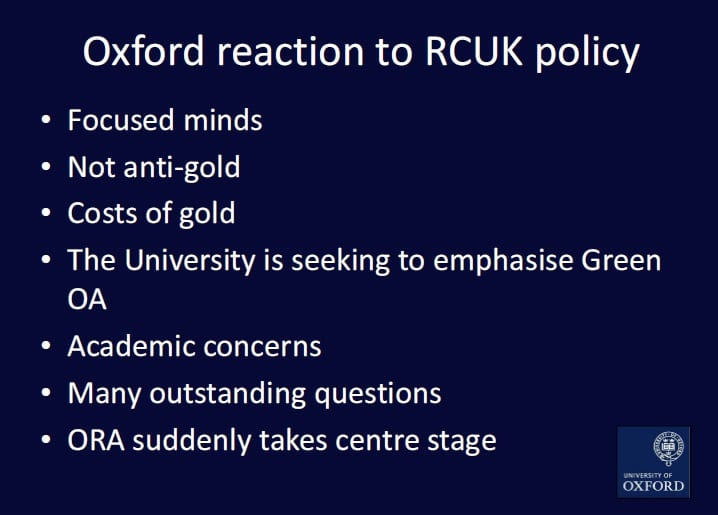This is a guest post by Pablo de Castro, UK RepositoryNet+ Consultant.
Please do also take the time to complete the RepNet survey at http://ukcorr.org/events/future-events/teesside-university-friday-9th-november-2012/repnet_survey/
________________________________________________________________
Much has been said in recent months about the Gold Rush and the financial unsustainability of a given way of planning the transition to research output dissemination through Gold Open Access publishing models. However, the ‘Gold Rush’ may be better than no rush whatsoever, and the post-Finch emphasis on Gold OA models has resulted in the profile of colour-agnostic Open Access getting significantly raised among Research Committees at HEIs following effective communication efforts by Institutional Repository (IR) managers and University Libraries. Furthermore, the current analysis on potential Open Access policy compliance mechanisms could well result in a substantial wave of supporting policies at institutions towards IRs and Green Open Access.
All these issues were discussed last Tuesday Dec 4th at the RSP webinar ‘The Role of Institutional Repositories after the Finch Report’. Three prominent IR managers -Sally Rumsey, U Oxford, Dominic Tate, Royal Holloway U London (RHUL) and Miggie Pickton, U of Northampton- were delivering presentations on the present state of IR/Open Access awareness and the role IRs will play for policy compliance purposes at their universities.
Each of them provided a very useful specific insight on the point discussions are right now at their institutions: research-intensive U Oxford (80k publications/year) has set up an OA@Oxford Programme lead by the Bodleian Libraries and involving Research Services, IT Services and Academic Divisions. The programme comprises ten projects, three of which are focused on the Oxford Research Archive (ORA) IR (see Sally Rumsey’s presentation to learn more). Royal Holloway Research Online manager and his Library Director presented a brief and solid report to their Research Committee last September on the current state of OA policies which was praised by the Committee and has lead the way to subsequent discussions on possible ways to deliver compliance – Dominic Tate incidentally made an offer to share this report with other IR managers interested in carrying out their own awareness raising activities for their Research Committees. Finally, Miggie Pickton mentioned her calculation of the costs attached to Gold Open Access publishing of the U Northampton yearly research output as an input to the University Research and Enterprise Committee.
All three IR managers agreed that there were big opportunities for IRs as a result of the endorsement for Open Access delivered by the Finch report, regardless of what the recommended form was for realising it. As a result of the Finch report and the subsequent RCUK Open Access policy, scholars and institutional administrators now need to be aware of what Open Access is and what the requirements will be for universities in order to be eligible for receiving RCUK funding. Central Open Access publishing funds -such as the one already available at the University of Nottingham – are currently under consideration at many HEIs as a mechanism for effectively dealing with RCUK block grants and other funders’ requirements in terms of Open Access publishing. This discussion may very much reinforce the role IR managers and Libraries play in conveying the Open Access agenda to institutions, since no-one knows better about Open Access than they do. Preliminary Gold Open Access publishing cost analysis provided by IR managers to their Research Committees in the course of this discussions have resulted in Institutional Repositories being brought into consideration as a much cheaper, already available option for delivering compliance at institutional level.
IRs are however unevenly placed to take advantage of these opportunities: many of them are presently very poorly populated and feature large rates of metadata-only items. In order to be able to stand up to the requirements in terms of monitoring policy compliance, IRs will need to offer institutions a reliable set of functionalities for tracking Open Access outputs (and eventually payments, see the recently released RIN/OAIG report on the issue). This is what the UK RepositoryNet+ (aka RepNet) Project is working for: to provide the means to extend already existing IR tools and services to the whole IR network and to promote the implementation and use of new repository functionalities that allow IRs to become central pieces in the institutional research information management (RIM) services.
After the project presentations delivered a few weeks ago at the UKCoRR membership meeting at Teeside University, the RepNet put out a survey for collecting information from IR managers on the current state of service tool awareness and availability at IRs. The results of this survey -which account for over 20 answers so far- will shortly be disseminated from this UKCoRR blog. One of the questions in this survey deals with available RIM infrastructure at institutions, since we consider there is a pressing need for having an accurate landscape of CRIS/IR availability at HEIs in order to avoid effort duplication in building reporting tools. A preliminary RepNet note is already available examining use cases for RIM infrastructure configurations at HEIS, from IR-only and IR-as-CRIS to CRIS-only and CRIS-as-IR case studies through all possible ways of system co-existence. Once this CRIS/IR directory is complete, it will be made available by the RepNet and we hope it will be useful for building models on top of it, be it for REF reporting or now also for delivering OA compliance and reporting about it.
An overview of the different strategies for supporting and enhancing IRs the RepNet is working on will be delivered at the joint RepNet/RSP WS to be held in London next Jan 21st. After useful discussions last November at Teesside University, the RepNet will again be eager to promote discussion and to collect feedback and suggestions from the wider IR manager community.
